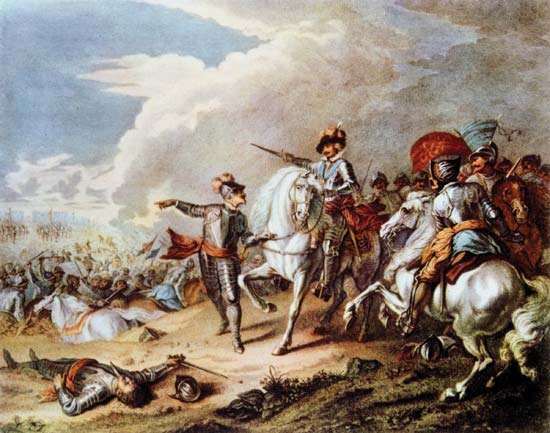MAY 11, 2021 – Lately I’ve been reading about the English Civil War. Through a modern lens, that episode offends modern sensibilities. Then I catch myself. Returning to the present, I check my newsfeed and wonder: Who’d be more shocked and awed—a person from England in 1649 (the year the king lost his head) viewing our times or one of us returning to Old England a generation after the Pilgrims left for New England?
Or . . . would closer examination reveal the difference in times to be largely tactical . . . or merely sartorial?
To our modern notion of “the rule of law,” the divine right of kings seems as outlandish as it is outmoded—until we climb inside the head of one of my brothers-in-law, whose favorite line in any discussion of politics started with, “If I were king . . .” That was before You-Know-Who, who rules the Republican Party, shouting, “I am king!” to swooning masses wearing red caps—a brother-in-law or two among them.
Likewise, the blood-feud between Catholics and Protestants is only below the surface today in Northern Ireland—as many Christians gather across our country sit in supreme judgment of other . . . Christians. Not so long ago (“ahem”), I sang Onward Christian Soldiers—regularly in church. It started, “On-ward Christian So-oldiers, marching as to-o WAR!” No one gave a thought to its impropriety. Feuding Christians of England during its Civil War would’ve joined robustly in our battle hymn—at least until the monarchists realized we were Protestants.
I’m not sure how the English of yesteryear would’ve reacted to Black Lives Matter. Strike that. Of course I’m sure.
Now fast forward to late 1963 and the assassination of President Kennedy, and I’m sure out of the chute what descendants of yesteryear English (and contemporaries across Europe in the mid-1600s) thought of people of African lineage . . .
. . . to my astonishment, over the weekend I heard my good friend Dr. Ravi tell a broadly revealing anecdote about The Assassination. He was a second-grader at the time. He’d been in the country for only six months, a recent transplant from India, where his father, a rising star, as it were, in the world of astro-physics, had been recruited by NASA. Ravi’s family settled just outside Baltimore, south of the Mason-Dixon line, the historical significance of which, of course, was yet to be learned by the young immigrant.
Early into his American life, BAM!—“the [second] shot heard ’round the world” was fired. Ravi’s school, as all others in the country, let out early, and soon the kid was crammed onto a bus with dozens of white schoolmates. Alert to the talk around him, Ravi soon learned that the universal assumption among his fellow passengers was that a Black man (doubtless called something other than “Black”) was the assassin. After all, weren’t Blacks, by definition, the bad people?
The more that history unfolds, the more it stays the same.
(Remember to subscribe to this blog and receive notifications of new posts by email.)
© 2021 by Eric Nilsson
